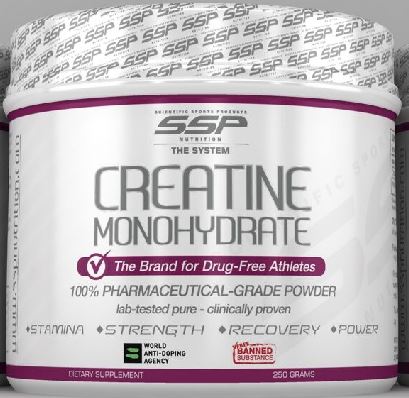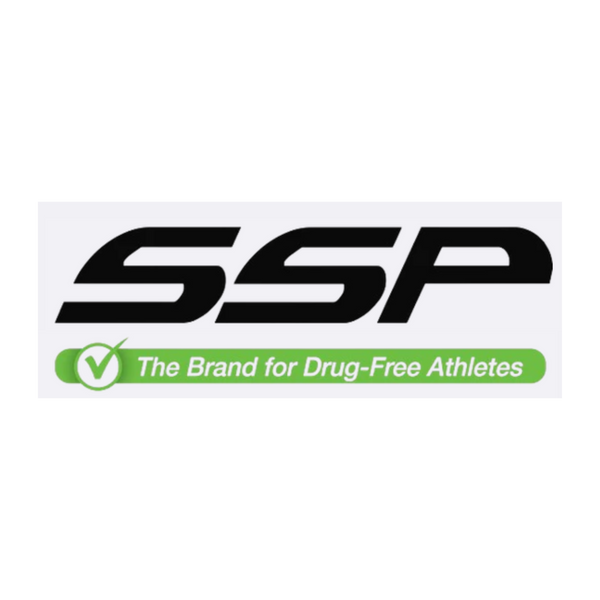
Creatine is one of the Most Popular Nutritional Ergogenic Aids for Athletes
International Society of Sports Nutrition position stand: safety and efficacy of creatine supplementation in exercise, sport, and medicine
Journal of the International Society of Sports Nutrition; Read Complete Article: https://jissn.biomedcentral.com/articles/10.1186/s...
The purpose of the International Society of Sports Nutrition review is to provide an update to the current literature regarding the role and safety of creatine supplementation in exercise, sport, and medicine and to update the position stand of International Society of Sports Nutrition (ISSN).
- Studies have consistently shown that creatine supplementation increases intramuscular creatine concentrations which may help explain the observed improvements in high intensity exercise performance leading to greater training adaptations.
- In addition to athletic and exercise improvement, research has shown that creatine supplementation may enhance post-exercise recovery, injury prevention, thermoregulation, rehabilitation, and concussion and/or spinal cord neuroprotection.
- Additionally, a number of clinical applications of creatine supplementation have been studied involving neurodegenerative diseases (e.g., muscular dystrophy, Parkinson’s, Huntington’s disease), diabetes, osteoarthritis, fibromyalgia, aging, brain and heart ischemia, adolescent depression, and pregnancy.
- These studies provide a large body of evidence that creatine can not only improve exercise performance, but can play a role in preventing and/or reducing the severity of injury, enhancing rehabilitation from injuries, and helping athletes tolerate heavy training loads.
- Additionally, researchers have identified a number of potentially beneficial clinical uses of creatine supplementation.
- These studies show that short and long-term supplementation (up to 30 g/day for 5 years) is safe and well-tolerated in healthy individuals and in a number of patient populations ranging from infants to the elderly.
- Significant health benefits may be provided by ensuring habitual low dietary creatine ingestion (e.g., 3 g/day) throughout the lifespan.

SSP Pharm Grade Creatine Monohydrate: http://www.sspnutrition.com/ssp-creatine-monohydra...

"Ingesting creatine with carbohydrate or carbohydrate and protein have been reported to more consistently promote greater creatine retention"
SSP PRE & POST both contain Creatine HCl: http://www.sspnutrition.com/workout-canister-set/
Excerpts from article: Please visit https://jissn.biomedcentral.com/articles/10.1186/s... for complete article.
- In terms of performance, the International Society of Sports Nutrition (ISSN) has previously concluded in its position stand on creatine supplementation that creatine monohydrate is the most effective ergogenic nutritional supplement currently available to athletes in terms of increasing high-intensity exercise capacity and lean body mass during training [5, 78]. Recent position stands by the American Dietetic Association, Dietitians of Canada, and the American College of Sports Medicine on nutrition for athletic performance all drew similar conclusions [91, 92]. Thus, a wide-spread consensus now exists in the scientific community that creatine supplementation can serve as an effective nutritional ergogenic aid that may benefit athletes involved in numerous sports as well as individuals involved in exercise training.
- Ingesting creatine with carbohydrate or carbohydrate and protein have been reported to more consistently promote greater creatine retention.
- Evidence also suggests that creatine supplementation may reduce muscle damage and/or enhance recovery from intense exercise.
Safety
Since creatine monohydrate became a popular dietary supplement in the early 1990s, over 1,000 studies have been conducted and billions of servings of creatine have been ingested. The only consistently reported side effect from creatine supplementation that has been described in the literature has been weight gain [5, 22, 46, 78, 91, 92, 112]. Available short and long-term studies in healthy and diseased populations, from infants to the elderly, at dosages ranging from 0.3 to 0.8 g/kg/day for up to 5 years have consistently shown that creatine supplementation poses no adverse health risks and may provide a number of health and performance benefits. Additionally, assessments of adverse event reports related to dietary supplementation, including in pediatric populations, have revealed that creatine was rarely mentioned and was not associated with any significant number or any consistent pattern of adverse events [238, 239, 240].
- Recent research demonstrates a number of other applications of creatine supplementation that may benefit athletes involved in intense training and individuals who want to enhance training adaptations. For example, use of creatine during training may enhance recovery, reduce the risk of injury and/or help individuals recover from injuries at a faster rate. The following describes some applications of creatine in addition to serving as an ergogenic aid.
Creatine supplementation has primarily been recommended as an ergogenic aid for power/strength athletes to help them optimize training adaptations or athletes who need to sprint intermittently and recover during competition
Nelson and colleagues [104] reported that creatine loading prior to performing an exhaustive exercise bout and glycogen loading promoted greater glycogen restoration than just carbohydrate loading alone. Since glycogen replenishment is important to promoting recovery and preventing overtraining during intensified training periods [78], creatine supplementation may help athletes who deplete large amounts of glycogen during training and/or performance to maintain optimal glycogen levels.
Potential ergogenic benefits of creatine supplementation

Examples of sport events that may be enhanced by creatine supplementation
Increased PCr
• Track sprints: 60–200 m
• Swim sprints: 50 m
• Pursuit cycling
Increased PCr Resynthesis
• Basketball
• Field hockey
• America Football
• Ice hockey
• Lacrosse
• Volleyball
Reduced Muscle Acidosis
• Downhill skiing
• Water Sports (e.g., Rowing, Canoe, Kayak, Stand-Up Paddling)
• Swim events: 100, 200 m
• Track events: 400, 800 m
• Combat Sports (e.g., MMA, Wrestling, Boxing, etc.)
Oxidative Metabolism
• Basketball
• Soccer
• Team handball
• Tennis
• Volleyball
• Interval Training in Endurance Athletes
Increased Body Mass/Muscle Mass
• American Football
• Bodybuilding
• Combat Sports (e.g., MMA, Wrestling, Boxing, etc.)
• Powerlifting
• Rugby
• Track/Field events (Shot put; javelin; discus; hammer throw)
• Olympic Weightlifting
Prevalence of use in sport
Creatine is found in high amounts in the food supply and therefore its use is not banned by any sport organization although some organizations prohibit provision of some types of dietary supplements to athletes by their teams [5, 53, 78, 91, 92]. In these instances, athletes can purchase and use creatine on their own without penalty or violation of their banned substance restrictions. Americans consume over four million kilograms (kg) a year of creatine with worldwide use much higher [53]. The reported prevalence of creatine use among athletes and military personnel in survey-based studies has generally been reported to be about 15–40% [93, 94, 95, 96, 97, 98, 99, 100, 101], with use more common in male strength/power athletes. High school athletes have been reported to have similar prevalence of use of creatine [95, 96, 97, 102]. In 2014, the NCAA reported that creatine was among the most popular dietary supplements taken by their male athletes (e.g., baseball - 28.1%, basketball - 14.6%, football - 27.5%, golf - 13.0%, ice hockey - 29.4%, lacrosse - 25.3%, soccer 11.1%, swimming - 19.2%, tennis - 12.9%, track and field - 16.1%, wrestling - 28.5%) while female athletes reported a use rate of only 0.2 to 3.8% in various sports [103]. Comparatively, these NCAA athletes reported relatively high alcohol (83%), tobacco (10–16%), and marijuana (22%) use along with minimal androgenic anabolic steroid use (0.4%). As will be noted below, no study has reported any adverse or ergolytic effect of short- or long-term creatine supplementation while numerous studies have reported performance and/or health benefits in athletes and individuals with various diseases. Therefore, the prevalence of alcohol, tobacco and drug use among NCAA athletes would seemingly be a much greater health concern than athletes taking creatine.
Kreider and colleagues [109] reported that American collegiate football players ingesting 20 or 25 g/day of creatine monohydrate with a carbohydrate/protein supplement for 12 weeks during off season conditioning and spring football practice experienced greater gains in strength and muscle mass with no evidence of any adverse side effects. Additionally, in a study specifically designed to assess the safety of creatine supplementation, American collegiate football players ingesting about 16 g/day of creatine for 5 days and 5–10 g/day for 21 months had no clinically significant differences among creatine users and controls in markers of renal function, muscle and liver enzymes, markers of catabolism, electrolytes, blood lipids, red cell status, lymphocytes, urine volume, clinical urinalysis, or urine specific gravity [22]. Meanwhile, creatine users experienced less incidence of cramping, heat illness/dehydration, muscle tightness, muscle strains/pulls, non-contact injuries, and total injuries/missed practices than those not taking creatine [111].
Aging
A growing collection of evidence supports that creatine supplementation may improve health status as individuals age [41, 43, 44, 45, 195]. In this regard, creatine supplementation has been reported to help lower cholesterol and triglyceride levels [67, 196]; reduce fat accumulation in the liver [197]; reduce homocysteine levels [198]; serve as an antioxidant [199, 200, 201, 202]; enhance glycemic control [132, 203, 204, 205]; slow tumor growth in some types of cancers [32, 198, 206, 207]; increase strength and/or muscle mass [37, 41, 44, 45, 82, 208, 209, 210, 211, 212]; minimize bone loss [211, 212]; improve functional capacity in patients with knee osteoarthritis [213] and fibromyalgia [214]; positively influence cognitive function [43, 83, 195]; and in some instances, serve as an anti-depressant [215, 216, 217].
Position of the internationals society of sports nutrition (ISSN)
After reviewing the scientific and medical literature in this area, the International Society of Sports Nutrition concludes the following in terms of creatine supplementation as the official Position of the Society:
1. Creatine monohydrate is the most effective ergogenic nutritional supplement currently available to athletes with the intent of increasing high-intensity exercise capacity and lean body mass during training.
2. Creatine monohydrate supplementation is not only safe, but has been reported to have a number of therapeutic benefits in healthy and diseased populations ranging from infants to the elderly. There is no compelling scientific evidence that the short- or long-term use of creatine monohydrate (up to 30 g/day for 5 years) has any detrimental effects on otherwise healthy individuals or among clinical populations who may benefit from creatine supplementation.
3. If proper precautions and supervision are provided, creatine monohydrate supplementation in children and adolescent athletes is acceptable and may provide a nutritional alternative with a favorable safety profile to potentially dangerous anabolic androgenic drugs. However, we recommend that creatine supplementation only be considered for use by younger athletes who: a.) are involved in serious/competitive supervised training; b.) are consuming a well-balanced and performance enhancing diet; c.) are knowledgeable about appropriate use of creatine; and d.) do not exceed recommended dosages.
4. Label advisories on creatine products that caution against usage by those under 18 years old, while perhaps intended to insulate their manufacturers from legal liability, are likely unnecessary given the science supporting creatine’s safety, including in children and adolescents.
5. At present, creatine monohydrate is the most extensively studied and clinically effective form of creatine for use in nutritional supplements in terms of muscle uptake and ability to increase high-intensity exercise capacity.
6. The addition of carbohydrate or carbohydrate and protein to a creatine supplement appears to increase muscular uptake of creatine, although the effect on performance measures may not be greater than using creatine monohydrate alone.
7. The quickest method of increasing muscle creatine stores may be to consume ~0.3 g/kg/day of creatine monohydrate for 5–7-days followed by 3–5 g/day thereafter to maintain elevated stores. Initially, ingesting smaller amounts of creatine monohydrate (e.g., 3–5 g/day) will increase muscle creatine stores over a 3–4 week period, however, the initial performance effects of this method of supplementation are less supported.
8. Clinical populations have been supplemented with high levels of creatine monohydrate (0.3 – 0.8 g/kg/day equivalent to 21–56 g/day for a 70 kg individual) for years with no clinically significant or serious adverse events.
9. Further research is warranted to examine the potential medical benefits of creatine monohydrate and precursors like guanidinoacetic acid on sport, health and medicine.
Please visit https://jissn.biomedcentral.com/articles/10.1186/s... for complete article.

7 comments
viagra first time dose
viagra
Cheap Zithromax Uk smilapem buying cialis online fugalula commander cialis prix discount
RpvbueSCwknVT
TbjESBNgfVdz